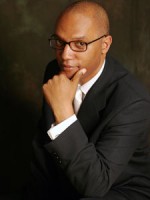Title
In a refreshingly inspired decision, the American Brass Quintet has commissioned a new composition from pianist and composer Billy Childs, and the result, 2 Elements, will receive its New York premiere on October 3 in the Peter Jay Sharp Theater.
Body
The A.B.Q. and Childs seem to be made for each other. Both have excelled in an astonishingly diverse range of musical situations, are virtuosos of the first order, have international followings—and most of all, are open to new and challenging musical experiences.
Childs was a toddler when the A.B.Q. was founded in 1960, and although they are based on separate coasts (the pianist hails from Los Angeles), a solid base in the classical music tradition informed both the young Childs and the members of the A.B.Q. One of the ensemble’s charter members, trumpeter John Eckert, was later to evolve into an original and in-demand jazz stylist. In many ways, both the A.B.Q. and Billy Childs have not so much broken as surmounted the musical barriers that too often separate musical genres.
Over the past four decades, the A.B.Q. has created an international legacy that is nonpareil, not only through scores upon scores of concerts and tours, but also through their residencies at Juilliard and the Aspen Music Festival. Not satisfied with the existing literature for brass quintet, the ensemble is responsible for a library of more than 150 works that they have commissioned or premiered, and have released approximately 50 recordings. The A.B.Q. has performed in Europe, Central and South America, the Middle East, Asia, Australia, and all 50 of the United States. Their making accessible a database of original works for brass quintet—more than 1,400 works written since 1950—is another major facet of their influence.
I caught up recently with Billy Childs, who was adjusting back to home life in Los Angeles after a long period on the road with trumpeter Chris Botti. It was a fruitful collaboration that resulted in two Grammy Awards for Childs: one for best instrumental composition, for his "Into the Light," and another (with Gil Goldstein and Heitor Periera) for best arrangement accompanying a vocalist, working with Sting singing "What Are You Doing the Rest of Your Life?" on Botti’s CD, To Love Again.
Childs had already written a piece for the Dorian Wind Quintet. "We toured with it and had a pretty successful run, personally and musically. Considering who the A.B.Q. has commissioned works from in the past, I’m honored to have this commission," he said.
He went on to explain: "The piece is called 2 Elements, and it's a reflection on water and fire. Both can extinguish each other, and I see them as both interdependent and opposites. Music is visual to me; I think of not only what a fire would sound like, but what it looks like. There are many different things that motivate people to compose. Some can be wanting to deal with just the music from a theoretical vantage point; then other people want to write expressionistic music with angst. Impressionists can try and relate to a visual; some relate to something in nature. The latter is what I intend to do; this is an aural representation of fire and water."
While structure is an important aspect, explains Childs, his ultimate goal is "to serve a dramatic purpose: to make the listener feel something"—whether it’s something they have felt before or not. "If the form can help the listener reach that, good. Sometimes I may think the musical architecture first—you may see it in your mind, and use that as a framework—but the ultimate goal is to get a dramatic effect across to the listener."
In his earlier work for the Dorian, said Childs, there were "places where everyone improvised over written motif—but I didn’t hear doing that for brass quintet. In this particular piece, we all play written things and then there are sections where I improvise. The sound of the brass instruments is very forthright, and can also be very fanfarish—there’s less variation in tone quality with a brass quintet than a woodwind quintet. Plus, the actual music I wrote didn’t call for a group improvisation."
Childs says he really doesn’t like being called a jazz composer. "It’s too limiting," he explains. "Similarly, I wouldn't respond to being called a classical composer. I'm 50, so the music that shaped my concept was in the early 70s, which was the fusion era—an unprecedented era of respect and tolerance between genres. You had Michael Tilson Thomas conducting the London Symphony Orchestra on a piece John McLaughlin wrote (Apocalypse); then you had Leonard Bernstein, who wrote the wildly eclectic Mass; you had Emerson, Lake and Palmer popularizing Copland and Ginastera in a rock context—you had all these genres merging together, so my whole conception is to somehow find an organic way to combine what are thought to be disparate elements of music."
While Childs says he loved spending much of 2006 touring with Chris Botti, "it took me out of my own context, compositionally. My dream would be to tour with my jazz chamber group so the world can see it, and do these commissions, keep the momentum going. I’ve been really fortunate to get commissions from really great artists, and I want to keep that fire burning."





